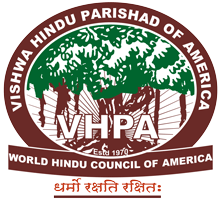Ekatmata Mantra
यं वैदिका मन्त्रदृशः पुराणाः इन्द्रं यमं मातरिश्वा नमाहुः।
वेदान्तिनो निर्वचनीयमेकम् यं ब्रह्म शब्देन विनिर्दिशन्ति॥
शैवायमीशं शिव इत्यवोचन् यं वैष्णवा विष्णुरिति स्तुवन्ति।
बुद्धस्तथार्हन् इति बौद्ध जैनाः सत् श्री अकालेति च सिख्ख सन्तः॥
शास्तेति केचित् कतिचित् कुमारः स्वामीति मातेति पितेति भक्त्या।
यं प्रार्थन्यन्ते जगदीशितारम् स एक एव प्रभुरद्वितीयः॥
English Transliteration:
yaṁ vaidikā mantradṛśaḥ purāṇāḥ indraṁ yamaṁ mātariśvā namāhuḥ |
edāntino nirvacanīyamekam yaṁ brahma śabdena vinirdiśanti ||
śaivāyamīśaṁ śiva ityavocan yaṁ vaiṣṇavā viṣṇuriti stuvanti |
buddhastathārhan iti bauddha jaināḥ sat śrī akāleti ca sikhkha santaḥ ||
śāsteti kecit katicit kumāraḥ svāmīti māteti piteti bhaktyā |
yaṁ prārthanyante jagadīśitāram sa eka eva prabhuradvitīyaḥ ||
Meaning:
Whom (Yam) the Vaidika Mantradrashah (those who have understood the Vedas and to whom the mantras were revealed), the Puranas (stories and history of ancient times) and other sacred scriptures call: Indram (Indra, the God of Gods), Yamam (Yama, the eternal timeless God) and Mātariśvā (present everywhere like air). Whom the Vedāntins (those who follow the philosophy of Vedānta), indicate by the word Brahma as the One (ekam) which cannot be described or explained (Nirvachaniya).
Whom the Śaivas call (Avochan) the Omnipotent (Yamisham) Śiva and Vaishnavas praise (stuvanti) as Vishnu, the Buddhists and Jains (Baudhajainaha) respectively call as Buddha and Arhant (without any end), whom the Sikh sages (Sikh-santaha) call Sat Śrī Akāl (the timeless Truth).
Some (kecit) call Whom as Śāstā, others (katicit) Kumāra, some call It Swāmī (Lord of the Universe and protector of all), some Mātā (divine mother) or Pitā (father). To whom they offer prayers, It (Sa) is the same and the only One (Eka Eva), without a second (advitiyah).
Vishwa Dharma Prãrthanã
sarvamañgala mãñgalyãm
devÏm sarvãrtha sãdhikãm |
saranyãm sarvabhùtãnãm
namãmo bhúmimãtaram || 1
saccidãnanda rupãya
visvamañgala hetave |
visvadharmaika múlãya
namostu paramãtmane || 2
visvadharma vikãsãrtham
prabho sanghatitã vayam |
subhãm ãsisamasmabhyam
dehi tat paripurtaye || 3
ajayyamãtma sãmarthyam
susilam loka pújitam |
jnãnam ca dehi visvesa
dhyeya mãrga prakãsakam || 4
samutkarsostu no nityam
nihsreyasa samanvitah |
tatsãdhakam sphuratvantah
suvÎravratamujvalam || 5
visvadharma prakãsena
visvasãnti pravartake |
hindusanghtanã kãrye
dhyeyanisthã sthirãstunah || 6
sanghasaktirvijetrîyam
krtvãsamaddharma raksanam |
paramam vaibhavam prãptum
samarthãstu tavãsisã || 7
tvadiye punya kãryesmin
visva kalyãna sãdhake
tyãga sevã vratasyãyam
kãyo me patatu prabho || 8
|| visva dharma ki jay ||
Sangathan Mantra
San gachhadhwam, sam vadadhwam sam vo manaansi jaanaatam. Deva bhaagam yathaa poorve sanjaanaanaa upasate.
Samano mantrah Samitih Samani Samanam Manah Saha Chittamesham Samanam Mantramabhimantraye Vah Samanena Vo Havisha Juhomi
Samanee va Akootih, Samana Hrudayani Vah Samanamastu Vo Mano, Yatha Vah Susahasati
Let us meet together, talk together, let our minds apprehend alike, in like manner as the ancient Devas, concurring, accepted their portions of offerings.
Common be our prayer, common be the acquirement, common be the purpose, associated be the desire. I repeat for you a common prayer, I offer for you a common oblation.
Common be you intention, common be the wishes of your hearts, common be your thoughts, so that there may be thorough union amongst you.
Individual upliftment, individual liberation is not the goal; and individual thought or individual action is not the means or the process.
Collective thought, collective speech, collective exertion, collective assertion is our mode of thinking and action.
The goal of Lok-Sangraha not reached until every member of the society is fulfilled, is prosperous, is liberated.

